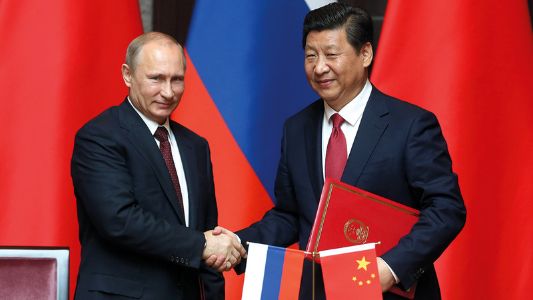
-
Published: 31 December 2022

Russian President Vladimir Putin and his Chinese counterpart Xi Jinping recently held talks to coordinate positions and strengthen partnership, amid the polarizations and acute international crises that erupted during 2022, foremost of which is the Ukrainian crisis and the resulting energy, security and food crises around the world
Putin said that the importance of Russian-Chinese relations is increasing as a stabilizing factor in the world, adding: "We will continue to cooperate with China in the military field and coordination in international arenas," and stressed that Russia will continue to defend its positions and interests.
"In the context of growing geopolitical tensions, the importance of the Russian-Chinese strategic partnership as a stabilizing factor is increasing. Our relations stand up well to all tests, show maturity and stability, develop dynamically. As we noted earlier, these relations are the best in history and represent a model of cooperation of the great powers of the XXI century,"he said.
For his part, the Chinese President said that"our partnership with Russia is developing widely and shows the strength of the relationship between the two countries," stressing that China is ready to raise the level of political interaction with Russia and be an international partner in the difficult global situation.
Meanwhile, the US State Department expressed concern about what it considered China's support for Russia as the war in Ukraine continues, against the background of the contact between Putin and Jinping.
"Beijing claims neutrality, but its behavior shows that it continues to invest in strong relations with Russia," a US State Department spokesman said, adding that Washington was "closely monitoring Beijing's activities".
Observers and experts pointed out that the current year witnessed the intensification of the Russian-American and Western conflict over the Ukraine crisis, and the escalation of Sino-American tension over the Taiwan issue, especially following the visit of US House Speaker Nancy Pelosi to Taipei, contributed to strengthening the strategic rapprochement between Beijing and Moscow, which seems to be consolidated over the next year.
The steps of rapprochement between Moscow and Beijing are increasing to counter American and Atlantic influence in many areas that they consider as traditional vital areas, such as in the Baltic states, Eastern Europe, East and South Asia, amid the intensification of tensions in some of those regions, between them and the United States and its allies such as Japan.
According to observers, the timing of this conversation between the Russian and Chinese leaders is often intended to emphasize that the two sides will work to strengthen their partnership in the face of the challenges facing them, and in the context of their quest, as they say, to build a multipolar world.
Other analysts believe that Washington will in return strengthen its regional alliances in eastern Europe and in South and East Asia, and to increase the pace of security and military coordination in particular with Kiev, Tokyo, Seoul and Canberra.
